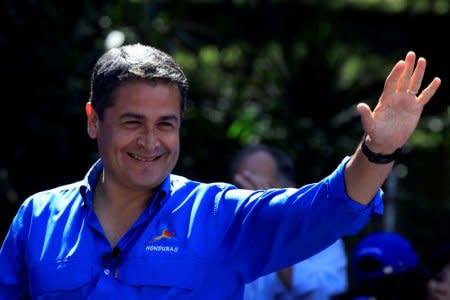U.S. ally seen clinching re-election in Honduras vote, eight years after coup

Thomson Reuters
By Gabriel Stargardter
TEGUCIGALPA (Reuters) - Eight years after a coup sparked by a previous president's flirtation with a second term, voters in the poor Central American country of Honduras look poised on Sunday to re-elect their U.S.-friendly leader whose assault on gangs has slowed killings.
Juan Orlando Hernandez of the center-right National Party took office in 2014 vowing a militarized crackdown on endemic gang violence in one of the world's most violent countries. That effort has brought down the murder rate. The economy has also grown during his tenure.
His victory would be cheered in Washington, according to two U.S. State Department officials, who noted the United States had few steadfast allies among Central America's current crop of leaders with whom it can reliably work to fight poverty, migration and gang violence.
Honduras has long had close ties with the United States, which viewed the country as an ideological and military partner during the leftist guerrilla insurgencies that roiled the region throughout the Cold War era.
The U.S.-educated Hernandez has a close working relationship with U.S. President Donald Trump's chief of staff, John Kelly.
In 2009, the United States wrestled with how to respond to the removal of President Manuel Zelaya after he proposed a referendum on re-election. Nonetheless, U.S. officials now say they are not yet concerned that Hernandez is consolidating power, but want to see the passage of stalled legislation to impose a cap on presidential terms.
"Open-ended re-election is not good for democracy," said one U.S. diplomat. "We would very much like to see some sort of law that would regulate election."
Hernandez was among lawmakers who supported the ouster of Zelaya.
But following a 2015 Supreme Court decision that overturned a constitutional ban on re-election, Hernandez, 49, looks likely to win a second four-year term. Opinion polls have shown him with a double-digit lead over television host Salvador Nasralla, who heads a left-right alliance of Honduran opposition groups called the Opposition Alliance Against the Dictatorship.
The opposition argues Hernandez's presidential bid is illegal, and has refused to discuss term-limit legislation while coalescing to try to prevent him from clinching victory.
'BEST OFF STICKING WITH HIM'
Hernandez has won favor with the United States, working closely on U.S.-bound migration with Kelly when that official was head of U.S. Southern Command and the Department of Homeland Security. He has also led a purge of the police force and made it easier to extradite drug bosses.
The United States has few ideological allies in the region. Two leftist former guerilla leaders govern El Salvador and Nicaragua, while Guatemalan President Jimmy Morales has sought to banish a U.S.-backed anti-corruption body probing his family.
"There does seem to be more of a kinship in terms of how he sees governance," one of the U.S. officials in Central America said of Hernandez.
The president says he would keep soldiers on the streets to help the widely mistrusted police. He has also promised to lure foreign investment in textiles, call centers and auto manufacturing, creating 600,000 jobs and lifting growth to above 6 percent with infrastructure projects.
Hondurans applaud how Hernandez has lowered the murder rate to a projected 46 per 100,000 by the end of 2017 from 79 per 100,000 in 2013, while raising growth and lowering the deficit.
But he has not been immune to scandal.
The son of his political mentor, former President Porfirio Lobo, was recently sentenced to 24 years in prison for conspiring to import cocaine into the United States. During the trial, there were allegations that drug money was funneled to Hernandez's campaign, a charge his office denied.
In 2015, Hernandez admitted his 2013 campaign took money from companies linked to one of the worst corruption scandals in the country's history, but said he and his National Party were unaware of where the money came from.
Manuel Orozco, a senior fellow at the Washington-based Inter-American Dialogue, said that despite the president's flaws, the United States had decided it could still do business with Hernandez, its "most important ally" in Central America.
"Of all the people in that country, they realize they're best off sticking with him," he said.
(Reporting by Gabriel Stargardter; Editing by Frank Jack Daniel and Peter Cooney)
See Also:

 Yahoo News
Yahoo News 
